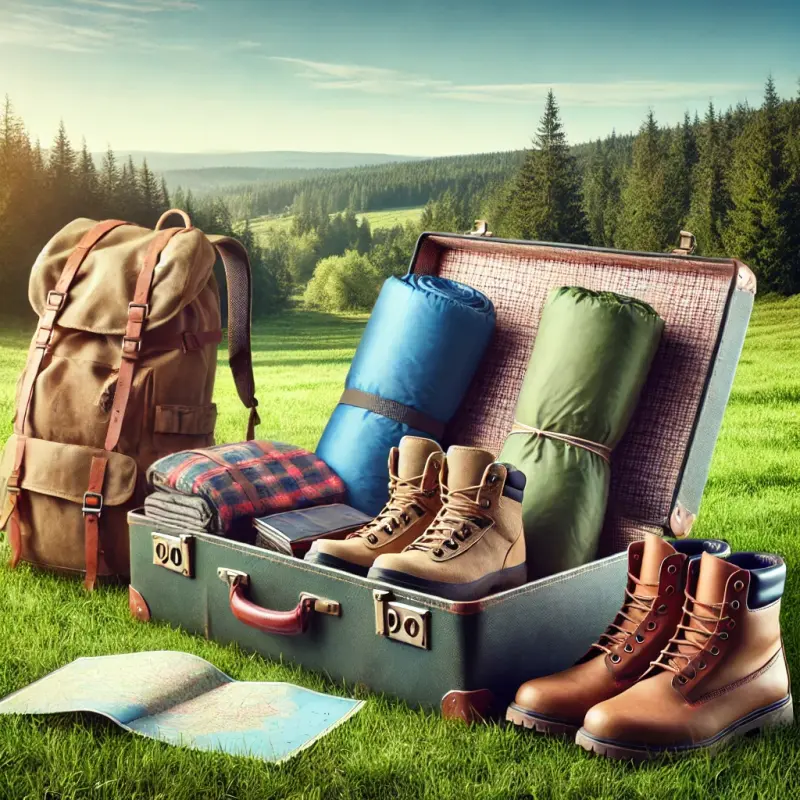How to Pack a Suitcase for a Nature Trip
Planning a trip to the great outdoors can be exciting but also challenging when it comes to packing. Whether you are heading for a weekend camping adventure, a long hike, or a tranquil stay in a nature reserve, having your suitcase well-organized is essential for a smooth experience. In this guide, we will walk you through an effective way to pack everything you need, from clothing to outdoor essentials.

1. Choose the Right Suitcase or Backpack
Your first step in preparing for a nature trip is selecting the right luggage. A suitcase with sturdy wheels might work well for a nature reserve or a cabin stay, while a rugged backpack is more suitable for camping or hiking trips. Consider the following factors:
- Capacity: Make sure your suitcase or backpack can fit all your essentials but isn’t too heavy to carry or roll.
- Durability: Opt for weather-resistant material, especially if your adventure involves exposure to unpredictable weather.
2. Start with Clothing Essentials
Packing the right clothing can make or break your nature experience. Here’s how to pack efficiently:
- Layering is Key: Nature trips often come with changing weather. Start with base layers like moisture-wicking t-shirts and thermal tops. Mid-layers, such as fleece or a lightweight jacket, add warmth, and waterproof outer layers keep you dry.
- Pants and Shorts: Pack versatile pants that are lightweight yet sturdy. Convertible pants that can switch into shorts are a great option for changing conditions.
- Footwear: Comfortable hiking boots or waterproof shoes are a must. Also, pack a pair of sandals or slip-on shoes for use around the campsite.
- Accessories: Include a hat for sun protection, gloves for colder climates, and a scarf or neck gaiter.
Pro Tip: Roll your clothes instead of folding them to maximize space in your suitcase.
3. Organize Your Camping Gear
Camping gear varies based on the duration and type of your trip, but some essentials should always make it to your list:
- Sleeping Bag and Mat: Choose a compact sleeping bag appropriate for the climate of your destination. A lightweight sleeping mat adds comfort.
- Tent and Accessories: If your trip involves camping, pack a tent, stakes, and a compact tarp for extra ground protection.
- Lighting: Headlamps and portable lanterns are practical for evening activities. Remember extra batteries.
4. Prepare Food and Kitchen Essentials
Staying well-fed during your adventure is crucial. Here's what to include:
- Portable Stove and Cookware: If allowed, pack a small stove and lightweight cookware. Opt for multi-use utensils to minimize space.
- Reusable Containers: These are perfect for packing snacks and pre-cooked meals.
- Storage Bags: Use sealable bags to keep food fresh and prevent spills.
Pro Tip: Plan your meals in advance to ensure you bring just the right amount of food, reducing waste and optimizing your packing.
5. Pack Must-Have Accessories
Nature trips require a range of accessories to ensure comfort and convenience. Here are some you should consider:
- Map and Compass: Essential for navigating trails, especially where cell service is unreliable.
- First Aid Kit: Always have a basic first aid kit tailored to outdoor situations. Include bandages, antiseptic wipes, and tweezers.
- Multi-Tool: A versatile multi-tool can be a lifesaver for cutting, opening cans, or making small repairs.
- Reusable Water Bottle and Filter: Staying hydrated is crucial. A durable water bottle and a portable water filter will ensure a continuous supply of fresh water.
6. Smart Packing Tips
Packing efficiently isn’t just about organization but also about accessibility:
- Compression Bags: These are great for reducing the size of bulky items like jackets or sleeping bags.
- Packing Cubes: Use packing cubes to separate clothing, gear, and accessories, making it easier to find items when you need them.
- Weight Distribution: Keep heavier items like shoes and camping gear at the bottom of your suitcase or the section closest to your back in a backpack.
Pro Tip: Always keep frequently used items, like snacks or a first aid kit, easily accessible.
Final Checks Before You Leave
Before setting off on your adventure, do a final check:
- Weather Forecast: Review the weather to ensure you have the right gear and clothing.
- Destination Rules: Some nature reserves and campsites have specific guidelines, so check in advance.
- Test Your Gear: Make sure your tent, stove, and any other equipment are in working order.
To make your nature trip even more enjoyable, consider adding some thoughtful extras to your packing list. For instance, a lightweight hammock can offer a relaxing spot to enjoy the scenery or take a nap. Additionally, eco-friendly fire starters are great for campfires and leave less impact on the environment. Don't forget to bring biodegradable soap for cleaning dishes or yourself responsibly. Finally, dry bags can be lifesavers for keeping electronics or important items dry during unpredictable weather conditions.
Packing for a nature trip can be a rewarding experience when done thoughtfully. With your suitcase or backpack well-organized, you’ll be prepared to fully enjoy the wonders of the great outdoors, from scenic hikes to serene evenings under the stars. Safe travels and happy adventuring!
Articles
Join our mailing list for notifications about the newest and most engaging articles sent straight to your email.